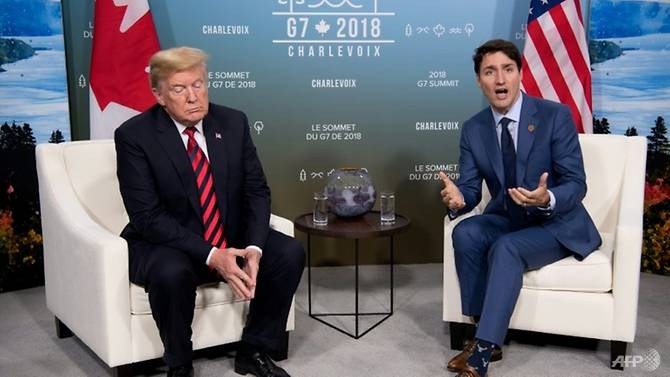Boycotts and nuclearisation: Canada defiant of Trump
 |
| US President Donald Trump and Canadian Prime Minister Justin Trudeau on the sidelines of the G7 Summit in Quebec Jun 8, 2018. (Photo: AFP/Saul Loeb) |
The grassroots backlash reflects the angry mood that has set in since Trump slapped punishing US tariffs on Canadian steel and aluminium and publicly assailed Prime Minister Justin Trudeau.
As the Canada-US relationship slides to new lows - with trade fights spilling into the aerospace and lumber sectors, and threatening the auto industry as well - Canadians are rallying behind Trudeau.
Canadian patriotism has bristled under hashtags like #BoycottUSA, #BuyCanadian and #VacationCanada that urge people not to buy American ketchup, coffee and cars.
"I think I'd be physically sick just seeing the US flag at the border. My tourist dollars are staying the hell out the US," Vancouver resident Tracey Hirsch said on Twitter.
Others posted images of "Trump-free grocery carts" and said they happily paid double for Canadian strawberries over imported US varieties, or took twice as long to shop in order to avoid American labels.
Canadian retailers also are being pressured to dump Trump ties and his daughter Ivanka's dress brand.
The National Post, meanwhile, mused about Canada building an atomic bomb to gain leverage with the US like North Korea did.
"We've got the uranium, the know-how and a sudden desire to be respected by our nearest neighbour," said the article.
The viral protest - which some said could backfire - has even swept up a few Americans.
"I'm an American but will be vacationing in #Canada this year to show support for our good friends and neighbors up north. #BuyCanadian," said Pittsburgh cartoonist Joe Wos in a social media post.
'PLAYING INTO TRUMP'S HANDS'
Ken Wong, a professor at the Smith School of Business at Queen's University in Kingston, Ontario, cautioned against "emotional responses," however.
A trade war "hurts everybody" while "playing into Trump's hands," he said.
"Is a boycott feasible? Yes. Is it advisable? Probably not," he said.
Canada and the United States traded an estimated US$673.9 billion worth of goods and services in 2017, with the US scoring a small surplus (US$8.4 billion), according to the Office of the US Trade Representative.
The United States is also the top destination for Canadian vacationers, who made 42 million trips to the US in 2017.
A report by conservative Canadian think tank C.D. Howe Institute concluded that the Trump administration is trying to keep others off-kilter on purpose.
"The Trump administration is deploying uncertainty as a new weapon in trade protection," it said.
Study authors Meredith Crowley and Dan Ciuriak argue that Trump's aim is to force US companies to repatriate manufacturing and reduce investment abroad to avoid getting locked out of the US market.
They pointed to "implausible claims, demands, and threats, which are then retracted, then re-asserted, and so on," including the US withdrawal or threatened withdrawal from major trade pacts, tariffs and undermining the WTO.
Despite the current tensions, officials in Ottawa have publicly vowed to press ahead in talks to revamp the North American Free Trade Agreement with Mexico and the United States.
But privately they lament the failure of facts and friendliness to sway Trump, after the G7 summit which Trudeau hosted in Quebec ended in bitter recriminations earlier this month.
Trudeau infuriated Trump by saying it was "insulting" to Canadian veterans who had stood by their US allies in conflicts dating back to World War I that Washington was invoking national security as justification for tariffs.
"Canadians are polite and reasonable but we will also not be pushed around," he said.
And he confirmed that Canada would press ahead with dollar-for-dollar retaliatory tariffs on Jul 1 as previously announced.
Trump slammed Trudeau as dishonest and weak, and said the prime minister's comments would cost Canada "a lot of money." A Trump aide said there was a "special place in hell" for Trudeau, though he later apologised for the remark.
"So, if this president insists on punching you in the nose and eating your lunch, why would you continue to pretend he's still a great neighbour and go over to his place to spend your time and money?" commented Mark Bulgutch, a Ryerson University journalism professor, in a Toronto Star opinion piece.
What the stars mean:
★ Poor ★ ★ Promising ★★★ Good ★★★★ Very good ★★★★★ Exceptional
 Tag:
Tag:
Related Contents
Latest News
More News
- Russian President congratulates Vietnamese Party leader during phone talks (January 25, 2026 | 09:58)
- Worldwide congratulations underscore confidence in Vietnam’s 14th Party Congress (January 23, 2026 | 09:02)
- Political parties, organisations, int’l friends send congratulations to 14th National Party Congress (January 22, 2026 | 09:33)
- 14th National Party Congress: Japanese media highlight Vietnam’s growth targets (January 21, 2026 | 09:46)
- 14th National Party Congress: Driving force for Vietnam to continue renewal, innovation, breakthroughs (January 21, 2026 | 09:42)
- Vietnam remains spiritual support for progressive forces: Colombian party leader (January 21, 2026 | 08:00)
- Int'l media provides large coverage of 14th National Party Congress's first working day (January 20, 2026 | 09:09)
- Vietnamese firms win top honours at ASEAN Digital Awards (January 16, 2026 | 16:45)
- ASEAN Digital Ministers' Meeting opens in Hanoi (January 15, 2026 | 15:33)
- ASEAN economies move up the global chip value chain (December 09, 2025 | 13:32)






















 Mobile Version
Mobile Version